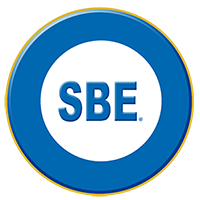Q. What is the passing score for the certification exams?
A. Certified Television Operator (CTO) – 70%
Certified Radio Operator (CRO) – 70%
Certified Broadcast Technologist (CBT) – 70%
Certified Broadcast Networking Technologist (CBNT) – 70%
Certified Video Engineer (CEV) – 70%
Certified Audio Engineer (CEA) – 70%
Certified Broadcast Television Engineer (CBTE) – 70%
Certified Broadcast Radio Engineer (CBRE) – 70%
Certified Broadcast Networking Engineer (CBNE) – 84% combined score of multiple choice and essay question
Certified Senior Television Engineer (CSTE) – 84% combined score of multiple choice and essay question
Certified Senior Radio Engineer (CSRE) – 84% combined score of multiple choice and essay question
8-VSB Specialist (8-VSB) – 84% combined score of multiple choice and essay question
AM Directional Specialist (AMD) – 84% combined score of multiple choice and essay question
ATSC3 Specialist (ATSC3) – 84% combined score of multiple choice and essay question
Digital Radio Broadcast Specialist (DRB) – 84% combined score of multiple choice and essay question
Q. What happens if I don’t pass?
A. You can retake the exam for a $36 fee as early as the next scheduled exam session.
Applicants are only notified whether they passed or failed an exam. Scores are not given out to anyone.
Q. How long will it be once I’ve taken the test before I know the results?
A. That answer varies depending on the type of test you have taken. An exam that doesn’t include an essay question can be graded and the results sent back within a couple days of receiving it at the SBE National office. If there was an essay included with the exam, those grades may take longer. (The essays are sent to members of the National Certification Committee for grading.)
For information on how the exams with essays are graded, see page 6 in the October 2011 issue of The Signal.
Check pages 6 and 7 of an article in the December 2010 issue of The Signal for a sample essay question and answer.
Q. Once I pass an exam, what then?
A. You will receive a card and certificate of certification in the mail. Your certification is valid for five years. SBE will also notify your employer, or anyone else you designate, of your certification if you request at the time of application.
Q. How many books may I bring to the examination?
A. As many as you like, but remember they cannot be used during the essay portion of the senior, specialist or networking engineer exams. You may also take in any book that you think may be helpful for your exam, even if it does not appear on the Suggested Reference Lists.
Q. How about written notes?
A. You may utilize notes during the examination process. However, if you make notes during the exam, those must be turned in with the test and can not be taken out of the “testing room”. This is done to insure the integrity of the question database.
Q. Are calculators and computers allowed during the test?
A. Beginning in April 2017 the internet can be utilized during exams during the open-book period. Examinees are responsible for procuring the internet feed. Proctors are not responsible.
Q. Will success in a certification test guarantee a pay increase for me?
A. Sorry, no one can guarantee that. However, you will be joining a select group that proclaims to the world that they believe in investing in their future and improving their value to their employees.
Check out page 8 of the October 2009 issue of The Signal on why it is good to obtain and maintain your certification.
Q. How current are the exam questions?
A. They are reviewed by the Certification Committee at least three times per year. We make a significant investment to keep the questions aligned with current technology.
Check out page 8 of the October 2008 issue of The Signal about how the exam questions are created.
Q. How do I list my certifications
A. Check out this chart to better explain how to list your certifications.

